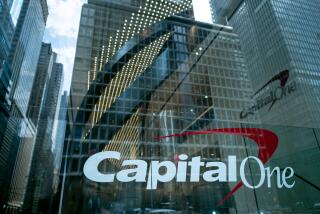Banks Without Borders
- Share via
Farmers in rural Jalisco and business big shots in Beverly Hills should be glad that Mexico’s largest independent bank is likely to be bought by New York-based Citigroup, the world’s largest financial institution. The deal would improve lives on both sides of the border, in part by boosting both nations’ economies.
Mexican President Vicente Fox has called the transaction, in which Citigroup would purchase Grupo Financiero Banamex-Accival, a show of trust in Mexico. Once Mexican and U.S. regulatory authorities approve the deal, and all the signs are they will, the integration of the two banks will bring badly needed financial stability, accountability and security to Mexico’s notoriously bad banking system.
Citigroup has agreed to pay $12.5 billion in cash and stock, roughly equivalent to all the foreign investment in Mexico in a good year. But this is not a one-sided bargain. By making trade easier, the merger would encourage U.S. business to sell even more technology and products to its second-largest trading partner--a nation whose economy grew 6.9% last year and whose trade with the United States now stands at about $275 billion annually, up from roughly $40 billion just a decade ago.
Despite this growth, Mexico is--to use Citigroup Chairman Sanford I. Weil’s word--severely “underbanked.” That means a lower percentage of Mexicans take out loans or hold savings or checking accounts than their U.S. counterparts. Still, some Mexicans were understandably concerned by this month’s announcement of the merger, which amounts to a foreign takeover of the Mexican bank.
These people need to remind themselves that over the past 30 years, a small group of powerful people effectively ruined the Mexican banking system. Mexican presidents first forced the banks to finance public ventures, then slammed the door on private lending, which left the country without real bankers. In 1991, then-President Carlos Salinas de Gortari’s privatization of the banks forced taxpayers to bail them out four years later at a cost of $100 billion.
This led Mexico to open its banking system to foreigners in 1996. With the Citigroup purchase, about 80% of the banking industry in Mexico will be controlled by foreign banks, thus bringing international regulations, procedures and standards to banks in Mexico.
That, and the fact that two smart Mexican billionaire bankers will join Citigroup’s board, should spur large regional development. The average Mexican consumer, meanwhile, can expect to benefit by having more and better banking services. And the deal is good news for Mexican Americans, as it opens the resources of a bank with offices in the two countries for deposits, lending and money transfers--already a $7-billion market.
More to Read
Inside the business of entertainment
The Wide Shot brings you news, analysis and insights on everything from streaming wars to production — and what it all means for the future.
You may occasionally receive promotional content from the Los Angeles Times.









